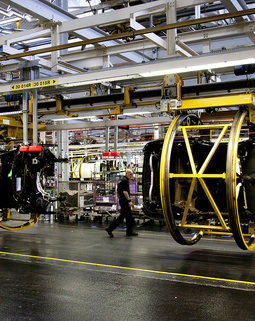Introduction
The government has approved the 2023 auto policy to boost local vehicle production, a significant development for the Nigerian automotive industry. Due to these policy changes, Innoson Motors, a prominent Nigerian automaker, is positioned for substantial growth. This article explores the critical facets of the policy, the potential impact on Innoson Motors, and the broader implications for Nigeria's automotive sector. Nigeria's automotive landscape is on the brink of transformation from domestic production incentives to economic growth prospects.
Supporting Local Manufacturing
The Nigerian government's approval of the 2023 auto policy underscores its commitment to promoting local manufacturing and reducing the nation's dependence on imported vehicles. This policy introduces incentives such as tax breaks and import duty waivers for automakers establishing production facilities within the country. Innoson Motors, as a homegrown manufacturer, stands to benefit significantly from these incentives, strengthening its position as a critical player in the local automotive industry.
Boosting Innoson Motors' Competitiveness
In addition to supporting local manufacturing, the 2023 auto policy emphasizes improving the competitiveness of Nigerian automakers. It encourages collaboration and partnerships with international automakers, facilitating technology transfer and skill development. Innoson Motors, with its experience and expertise, is well-positioned to engage in such collaborations, enhancing its capabilities and product offerings.
Economic Growth And Job Creation
The policy's focus on local vehicle production carries significant economic implications. It has the potential to stimulate economic growth by creating job opportunities in various sectors, from manufacturing to research and development. Innoson Motors' expansion and increased production capacity contribute to these job creation efforts, fostering economic development in Nigeria.
Enhancing Innoson Motors' Export Potential
The 2023 auto policy also allows Nigerian automakers to explore international markets. By producing vehicles that meet global standards and regulations, Innoson Motors can expand its export potential. This enhances the company's revenue streams and contributes to Nigeria's trade balance and foreign exchange earnings.
Conclusion
Innoson Motors, a prominent Nigerian automaker, is poised for substantial growth following the Nigerian government's approval of the 2023 auto policy. This policy, designed to promote local vehicle production, offers incentives for domestic manufacturing and collaborations with international automakers. Innoson Motors' position as a homegrown manufacturer positions it favorably to benefit from these initiatives, contributing to economic growth, job creation, and increased export potential. As Innoson Motors expands its footprint in the automotive industry, it plays a pivotal role in driving Nigeria's automotive sector toward self-reliance and global competitiveness.





